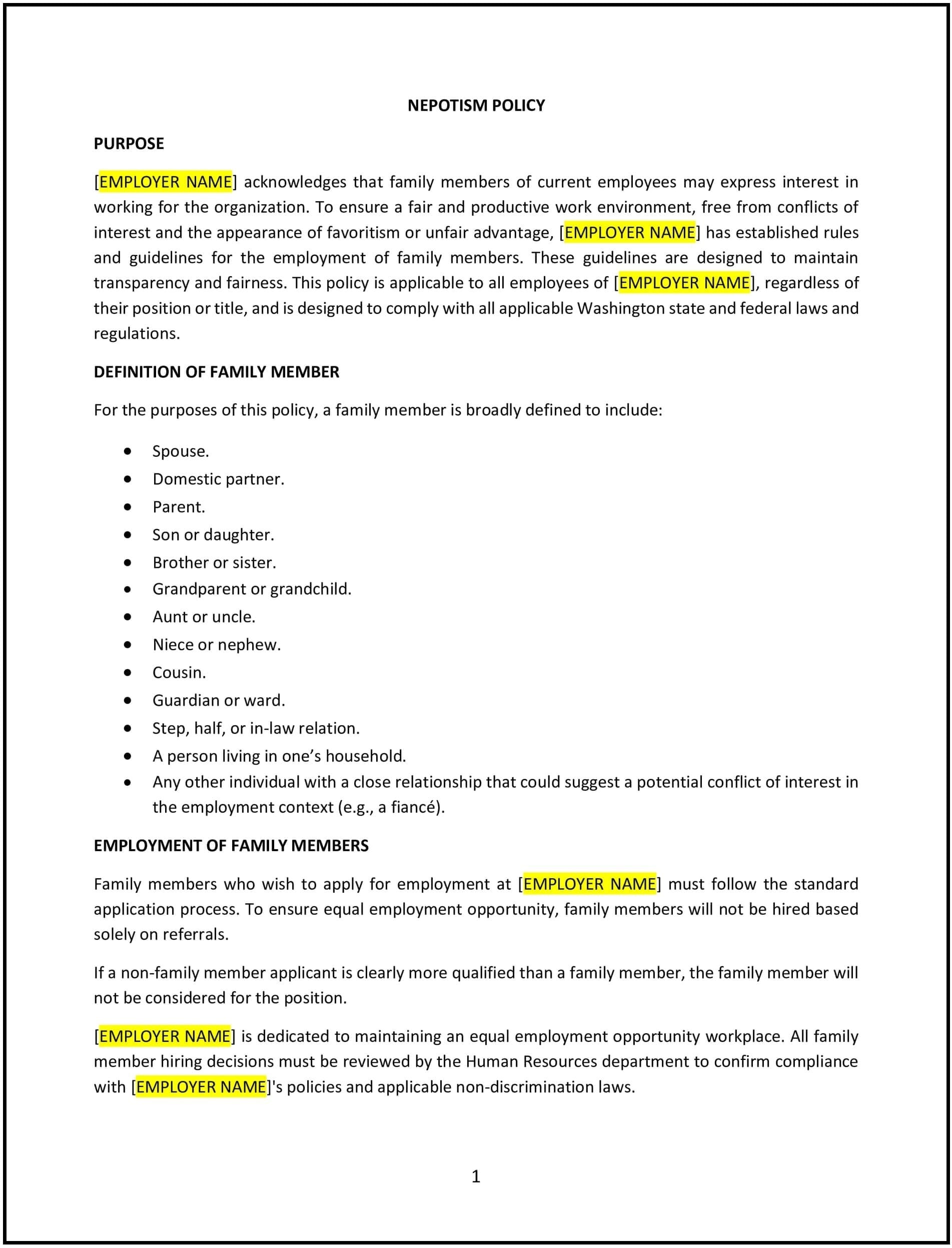Got contracts to review? While you're here for policies, let Cobrief make contract review effortless—start your free review now.

Customize this template for free
This nepotism policy is designed to help Washington businesses manage the hiring and promotion of family members and close relatives within the organization. The policy aims to prevent conflicts of interest, favoritism, and unethical decision-making while ensuring fair and equal treatment for all employees. It provides guidelines for how to handle the employment of family members in different departments, with a focus on maintaining transparency, ensuring merit-based decisions, and upholding the company’s values.
By adopting this policy, businesses can foster a fair and unbiased work environment while also complying with Washington state laws related to workplace discrimination and employee relationships.
How to use this nepotism policy (Washington)
- Define family relationships: The policy should specify what constitutes a "family member" or "relative" in the context of nepotism. This typically includes spouses, parents, siblings, children, in-laws, and any other close relatives. Clearly defining family relationships ensures the policy is applied consistently.
- Establish guidelines for hiring family members: The policy should outline the circumstances under which family members may or may not be hired. It should specify whether family members can be employed in the same department, report to one another, or hold positions where one relative has direct oversight of another. The policy should aim to avoid situations that could lead to conflicts of interest.
- Clarify guidelines for promotions and advancements: The policy should provide guidance on how promotions and advancements are handled when family members are involved. This may include requiring that promotions be made based on merit and performance, and specifying that family relationships should not influence promotional decisions.
- Implement reporting and disclosure procedures: The policy should require employees to disclose any family relationships with other employees or applicants. This disclosure helps the business manage potential conflicts of interest early on and ensure that decisions are made impartially.
- Address potential conflicts of interest: The policy should clearly state that family relationships should not influence work-related decisions, such as hiring, firing, salary decisions, or performance evaluations. It should also require managers and supervisors to recuse themselves from any decisions involving family members to avoid bias.
- Ensure compliance with Washington state laws: The policy should comply with Washington state laws regarding workplace discrimination and nepotism. The policy should also include provisions to prevent violations of labor laws and ensure that family members are treated fairly and equitably within the organization.
- Review and update regularly: Periodically review and update the policy to ensure it remains compliant with Washington state laws, federal regulations, and any changes in the company’s operations. Regular updates will help ensure the policy stays relevant and effective.
Benefits of using this nepotism policy (Washington)
This policy offers several benefits for Washington businesses:
- Promotes fairness and transparency: The policy ensures that all employees are treated equally and fairly, regardless of their family relationships. This promotes transparency and helps prevent any perception of favoritism or bias in hiring and promotion decisions.
- Reduces conflicts of interest: By establishing clear guidelines, the policy helps prevent situations where family relationships may create conflicts of interest or undermine the integrity of business decisions.
- Enhances organizational integrity: The policy helps maintain the company’s reputation by ensuring that hiring and promotion decisions are made based on merit and performance, rather than personal relationships. This strengthens the company’s ethical standards.
- Supports legal compliance: The policy helps the business comply with Washington state labor laws and federal regulations, minimizing the risk of legal challenges related to nepotism or discrimination.
- Improves employee morale: When employees know that decisions are made impartially and based on merit, it boosts morale and trust in management. It also reduces resentment or perceptions of unfair treatment among staff.
- Encourages merit-based advancement: The policy ensures that promotions and advancements are based on employee performance and qualifications, which fosters a culture of meritocracy and motivates employees to excel in their roles.
Tips for using this nepotism policy (Washington)
- Communicate the policy clearly: Ensure all employees understand the nepotism policy and how it applies to hiring, promotions, and other work-related decisions. Include the policy in the employee handbook and review it during onboarding.
- Require disclosures of family relationships: Employees should be required to disclose any family relationships with other employees or applicants to help the business identify and address potential conflicts of interest. Implement a system for tracking and managing these disclosures.
- Implement a fair hiring and promotion process: Ensure that hiring and promotion decisions are made based on merit and performance. Establish a clear process for evaluating candidates and promoting employees to ensure that family relationships do not influence decisions.
- Provide training for managers: Train managers and supervisors on how to handle situations involving family relationships in the workplace. They should be aware of the potential for bias and know how to make impartial decisions when evaluating candidates or employees.
- Monitor and enforce the policy: Regularly monitor hiring and promotion decisions to ensure they are being made in compliance with the nepotism policy. Take corrective action if any conflicts of interest or favoritism are identified.
- Review and update regularly: Periodically review the policy to ensure it remains compliant with Washington state laws, federal regulations, and any changes in the company’s operations. Regular updates will help keep the policy relevant and effective.